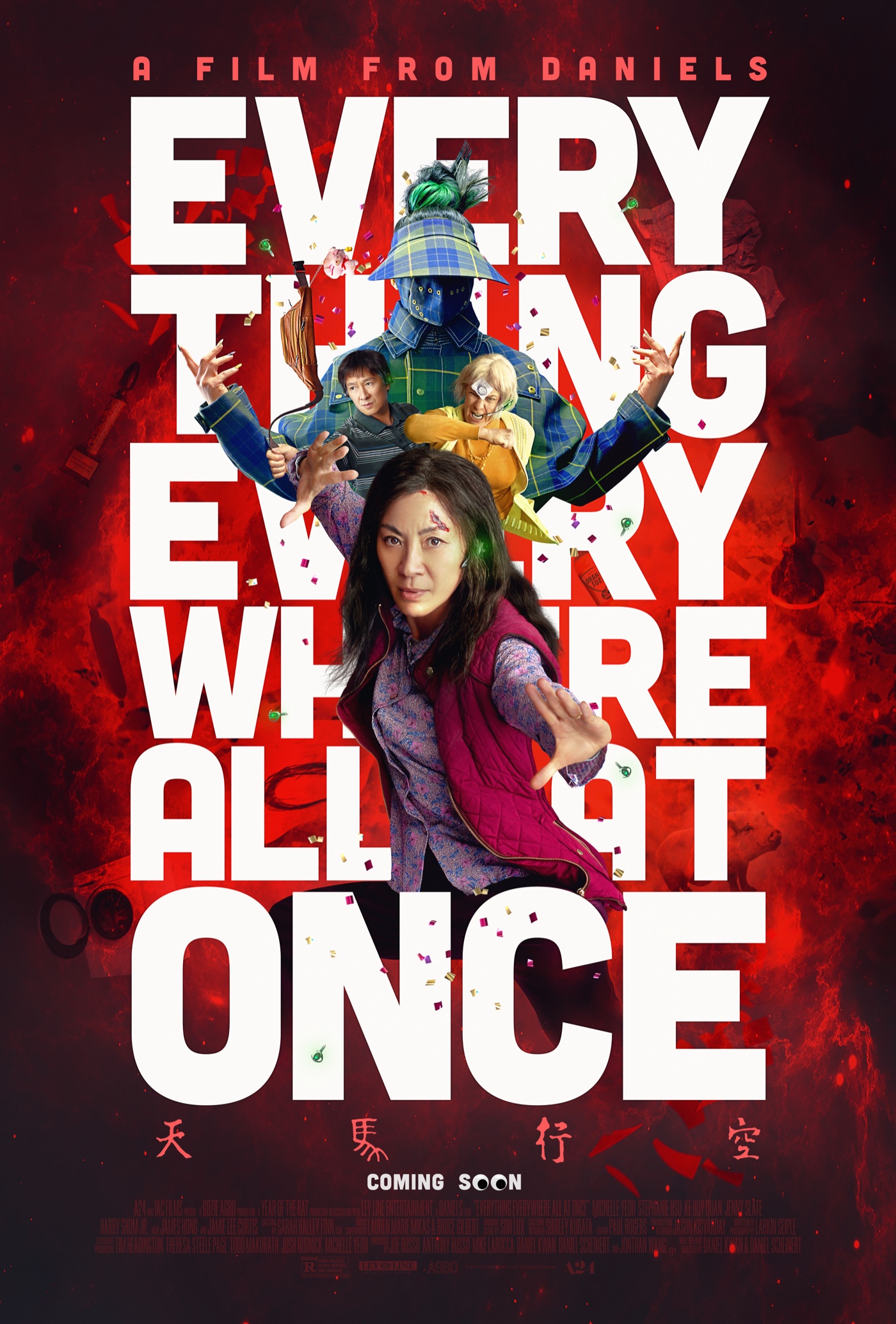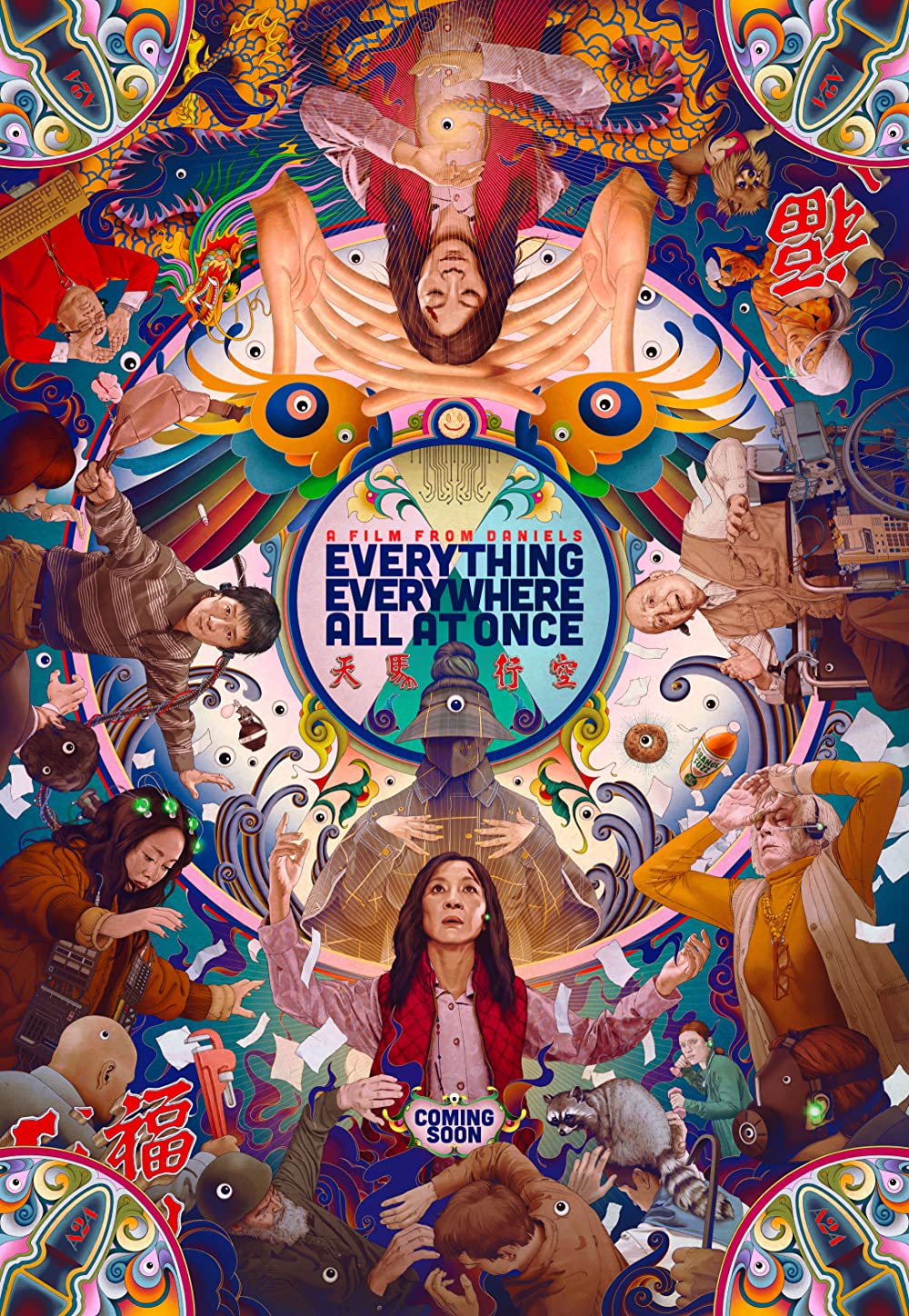by Brian Hioe
語言:
English
Photo Credit: Everything Everywhere All At Once
EVERYTHING EVERYWHERE All At Once is a triumph. The film can be categorized as “Asian American film,” but it is much more than that—Everything Everywhere All at Once is bold, innovative, and high-concept, while managing to engage with personal themes.
Everything Everywhere All At Once follows Evelyn, a first-generation Chinese American laundromat owner. At the start of the film, Evelyn and her family are being audited by the IRS. Her relationship is on the fritz with her daughter Joy and her husband Waymond. With Waymond, Evelyn has become increasingly emotionally distant and preoccupied with work, and Joy struggles to get her mother to accept her relationship with her girlfriend, Becky. To complicate matters, her father, only referred to in the film as “Gong Gong”, has recently moved in from China.
From there, the film shifts into the realm of high science fiction. Through Waymond’s body, Evelyn is contacted by another version of her husband from a universe referred to as the “Alphaverse”, who informs Evelyn that she has the ability to access the abilities of parallel universe versions of herself, and that she is the only person who can help stop Jobu Tupaki, a mysterious being able to jump between dimensions at will who has become a threat to the multiverse, having come to experience all possible versions of herself all at once. It is quickly revealed to Evelyn, however, that Jobu Tupaki is an alternate universe version of her daughter, transforming Evelyn and her family drama into a battle for the fate of the multiverse.
Carrying the film is Michelle Yeoh’s performance as Evelyn, playing not only the harried mother, but alternate universe versions of Evelyn ranging from a movie star to a chef and opera singer. Stephanie Hsu’s performance as the decidedly Millenial Joy/Jobu Tupaki and Ke Huy Quan’s performance as Waymond are also highlights, particularly with the Clark Kent/Superman transformation of the normal Waymond, his Alpha persona, and other variations.

Film poster
Quan played Short Round in Indiana Jones and the Temple of Doom and Gong Gong actor James Hong starred as villain Lo Pan in Big Trouble in Little China; both can be understood as historically problematic roles for Asian Americans, and so their performances may be seen as wry commentary. Yeoh’s role is also decidedly metafictional, with her movie star persona is clearly a fictionalized version of herself.
Indeed, much of Everything Everywhere All At Once is quite metafictional, with homages paid to movies ranging from Wong Kar-wai’s The Grandmaster, humor drawn from Stephen Chow, and Joy’s relationship with Becky having shades of Ang Lee’s The Wedding Banquet. The clear attempt of the film, then, as a product of Asian American film, is to pay tribute to some of the great masters of Asian cinema. Or this may be to distinguish Everything Everywhere All at Once from other Asian American film that has proven decidedly less aware of Asian cinematic predecessors.
Further cinematic referents include Hollywood film, with the notion of assimilating varying skillsets probably drawn from The Matrix, and scenes with characters interacting with each other in many different set-ups of the same scene probably drawn from Inception. Everything Everywhere All at Once also includes humorous commentary on Asian American film, as with the inclusion of a bizarre white martial arts mentor for one of the parallel universe versions of Evelyn, who speaks with a poor Mandarin accent but otherwise fits the tropes of mysterious martial arts mentors.
Yet the film is much more than just an “Asian American” film or a film about a family, which is why the film achieves greatness. Everyone wonders about alternate possibilities that they might have had in life, but Everything Everywhere All at Once casts this in existentialist terms, with regards to the greater significance or insignificance of one’s life when one can experience all of one’s possibilities contemporaneously.
The film answers, perhaps a bit tritely, that the meaning of one’s life lies in connections with one’s loved ones and family. Nevertheless, Everything Everywhere All at Once takes a humanistic lens on this, with even side characters given their own backstories and personal dramas. In this sense, Everything Everywhere All at Once is the rare film that manages to be both original, funny, and philosophically profound.



